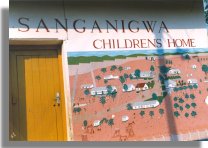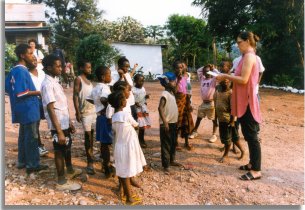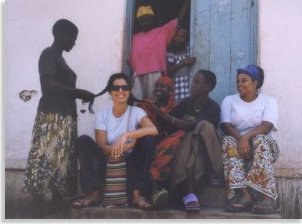|
|
|
|
|
SANGANIGWA CHILDREN’S HOME – KIGOMA, TANZANIA:
A SHORT DESCRIPTION OF THE PROJECT |
 |

Sanganigwa |
|
|
|
|
How can you help the
Sanganigwa Children's Home (italian version) |
|
Sanganigwa Children's Home
The “Sanganigwa Children`s
Home” orphanage is situated in Kigoma, one of the most isolated
and undeveloped areas of Tanzania. It gives hospitality to
children and teenagers from 4 to 24 years old (the age of the
orphans is more or less approximate due to the lack of documents
regarding the birth of each child). The children belong to
different ethnic and religious groups, and most of them are
orphans because of AIDS.
Some ildren
arrived at the Sanganigwa centre after they had been living on
the streets, where they put up with the most humiliating and
hardest jobs. The children and teenagers who are orphans or
abandoned are reported by the police or the local Catholic
Church, when nobody is able to take care of them. Sometimes they
still have relatives, but they are extremely poor and in many
cases they are already taking care of other children of the
family.
Sanganigwa is under the
jurisdiction of the local Catholic church and it is owned by
the Tanzanzian Government. It was founded in 1995 by the
educator Astrid Jangaard thanks to the financial support of
NORAD (Norwegian agency for cooperation and development) and
by Archbishop Paul Ruzoka of the Kigoma Diocese. In 1997 it
felt into a dramatic economic crisis.
In 1998 Daniela De Donno
Mannini, founder of the non-profit organization “The Jane
Goodall Institute Italia ONLUS” (JGI Italia), took
responsibility for the orphanage and started a distance
adoption program in Italy, to support the children of
Sanganigwa. Since then, the project is alive thanks to the
financing of those who, sensitive to solidarity, want to
contribute to the children’s maintenance. Today, the Italian
JGI provides the Home with medical assistance, food,
recreational and cultural activities (choir, acrobatics),
school education (primary, secondary, college, vocational
training), environmental education and private tuitions.
Moreover, we support the salaries of the Sanganigwa centre
workers each of whom has a numerous family to maintain.. We
built a play ground, a welding workshop, and started
specific small-scale breeding projects for cows, chicken,
and ducks. We take care of maintaining the structures, carry
out community surveys, psycho-pedagogic assistance,
community integration, and planning the entry of boys and
girls in the working life. We provide Sanganigwa with
clothes, shoes, linen and scholastic materials. More
activities are carried out by our Organization to guarantee
an optimal functionality of the House, for which the JGI
Italia is helped by Italian public Institutions. For example,
an infirmary and a library have just been opened through the
support of Regione Puglia; we have a tailor’s project
addressed to Kigoma street-children, with the contribution
of the City Hall of Pelago (Florence); we are active on the
side of children rights, and we organized a seminar with the
support of Livorno’s Province addressed to the local
authorities, and to the other attaining associations,
developing a network on the territory on children rights.
Coordinated by the social
worker Kenneth Hageze, the orphanage consists of a kitchen (with
charcoal cooker) joined to the refectory, a classroom, four
dormitories with bathroom, a office, two storerooms, a
building that is currently been restored in order to be used
as an infirmary, a lodging for four nuns, a lodging for two
social assistant (who are husband and wife), a stable
outside the house and a hen-house. From Monday to Friday
children attend school, some of them in the town of Kigoma,
others in one of the bordering towns. After lunch they study
with some teachers employed by us to integrate their school
curriculum; afterwards children take care of their
surroundings: they look after the domestic animals, they
learn to cultivate vegetables or to do housework. Children
with relatives still alive get in touch with them, and once
a year they have the possibility of going back to their
villages. This is organized by us in order not to loose
their family ties and to make the reintroduction in their
community easier. After the primary school (that lasts seven
years) we direct children towards the secondary or the
technical school (vocational training), depending on their
ability. They have the possibility of becoming electricians,
mechanics, carpenters, dressmakers, etc... In Kigoma there
aren’t any technical schools: for this reason girls and boys
who attend these schools catch the train everyday or, most
of the time, they sleep in lodgings annexed to the schools.
In these cases we pay a fee and supply the girls and boys
with all they need, even money to buy soap, hygienic wipes,
razors, etc. After secondary school, boys and girls can
decide to join a college, such as: tourism, nautical, art.
Periodically they come back to the Sanganigwa centre, their
home. After they finish school we buy them all they need to
start a job (a sewing machine, tools for carpenters,
electricians, etc.) and we pay the rent of a room in a
family for a whole year. We also buy a mattress, a table and
a chair.
The most widespread
diseases among children of this area are dermatitis,
intestinal infections, respiratory infections, malaria and
typhus. Malaria, in spite of mosquito-nets, strikes children
even three or four times a year. It’s not always necessary
to take children to the hospital every time, as the testing
can be carried out at the nearest clinic (on payment) and
the disease can be treated at the Sanganigwa centre. After
treatment, the children need a long convalescence period to
fully recover. Over the last years typhus has became more
frequent and strikes scholastic age children. We think that
they are infected at school, where they drink un-boiled
running water.
We buy AIDS medicines at Tanga Town (about 1800 km from us).
Medicines are mailed to us monthly.
Most of the children have
seen their parents die from AIDS, in other cases they were
neglected or nobody knows if their parents are still alive.
Sometimes they have been living with a relative who was
unable to bring them up: many often they were left alone all
day long without food, or they have been living with
prostitutes or criminals who abused them. One of our
children saw his mother killed for ethnic reasons. Children
who suffered for these reasons need psycho-pedagogical
support. We found this support in the Italian volunteer
Francesca Chiellini who works with the children for three
months each year. We consider continuing with this practice
very important, because is the only way for children to
overcome their traumas, to develop their self-esteem, to
strengthen their personalities.
Furthermore, Sanganigwa
is a concrete and important place where homeless children
come (about 280); they all come from Kigoma and we try to
involve them in social activities (choir, acrobatics,
psycho-pedagogical program). We hope in this way to keep them
busy and to give them a chance. In case of medical
emergencies or urgent surgery we try to do our best by
intervening and sometimes we contribute by giving them food.
|
|
 |
 |
|
Sustaining the project in the
long term
After having guaranteed
basic support and education, the construction of family
houses is planned to guarantee that the children grow in an
environment similar to that of a real family (instead of
dormitories, refectory and communal rooms).
We also plan to create new work opportunities (such as soap
and paper manufacturing), and to construct and organize
workshops for dressmakers, arts and crafts, clock repairers,
and also for repairing tires, bicycles, soldering, carpentry,
etc..
The Sanganigwa centre needs a food and drinks area and shops
to sell merchandise and to offer professional competences in
order to make the Sanganigwa centre autonomous.
|
|
 |
 |
|
Helping Sanganigwa - distance
sponsorship programme
The daily running of the
Sanganigwa orphanage is possible thanks to the
distance sponsorship programme,
launched in 1998 by JGI Italy, which targets private
citizens. The donors, who are all Italian, receive a
six-monthly or annual update on the progress of the
children’s home, a photo and a drawing. In addition specific
donations allows us to realise individual projects, for
example: the renovation of the buildings, the animal
enclosures, the playground, the “duck” project, the workshop
for welding, the library, the infirmary, the
psycho-pedagogic project to help the children overcome
trauma and develop self respect, and seminars on children’s
rights that involve the community as a whole. Over the years
the
Nando Peretti
Foundation (NPF) has made an extremely
valuable contribution to the work of JGI Italia for the
Sanganigwa Children's Home. Moreover, the NPF, together with
three other private Italian donors, will play a part in the
construction of ten family houses, which will replace the
current dormitories.
The demands for the
adequate growth and maintenance of Sanganigwa are still
numerous: workers need to be kept up-to-date, we must assure
psycho-pedagogical support to the children all year round,
we should increase the staff, we need a bus to be able to
transport the children and also to transport hay for the
cows and coal for cooking. We have to install a solar
heating system (electricity and cookers), to undertake a
socio-economic study focusing on the labor demands in the
region, in order to favor our girls and boys after studies
or training. We need to create new opportunities for them
such as paper and soap manufacturing, shoe making, etc., to
create workshops for the sale of merchandise with the aim of
making the centre autonomous.
Moreover, we must
guarantee a better life for street-children. The JGI Italy
plays an active role in supporting the street children of
the city both through training programmes and micro credit
projects as well as direct humanitarian aid (medical
assistance and food).
The project concerning the Kigoma street children still
requires the basics (buildings, food, medical care,
education).
To allow the children’s
home to function properly, and for the sake of the children
themselves, visits are discouraged by all the partners in
the project. Sadly, due to the invasiveness of western
tourists, the Sanganigwa staff have been obliged to say that
the orphanage is not a zoo. The privacy and safety of the
children are as important for us as their healthy and
peaceful development. Under certain circumstances visits to
the children’s home can be arranged with the project
partners as a direct consequence of the sincerity of the
donor and the specific project presented and supported.
In the
children to eat well, go to school and receive medical treatment is
essential guarantee continuity to our project and contribute monthly to
the orphanage’s expenses.
With a monthly contribution of 51 €uro, - 0,35 €uro a day! – you can help
the children to grow with greater hope for the future. Your precious aid
will be used to offer them food, medical treatment and the opportunity to
study. You’ll receive a group photo of the children and we’ll update you
annually on their progress. You can make your donation to our post office
account
n° 17559733 registered as Roots &
Shoots
We insist on underlining that
JGI-Italy only looks after this orphanage.
Our commitment to helping these
children is absolute
We believe that, in order to
make the economic aid for food, medical treatment and schooling effective,
Sanganigwa’s children have to be monitored during their studies until they
begin a professional career, respecting the individual talent and
personality of each child. Only in this way will ours be a realistic
contribution, so that in the future their own children won’t have to face
the same difficulties.
With a Little Help You Can
Change a Child’s Life
How can you help the
Sanganigwa Children's Home (italian version)
|
|
 |
 |
|
Justification of the Project
The Kigoma district, with
Kigoma as chief town (and the rural area) is situated along
Lake Tanganigwa in the extreme west of Tanzania; it borders
with Burundi and the D.R. of Congo.
It’s one of the poorest and least developed areas of
Tanzania, and also of the world. According to the U.N.D.P. (United
Nations Development Program) report of 2002 the index of
human development of Tanzania, that is a Country with a low
human development, is 151/173, the annual per capita income
is $523; 59.7%of its population lives under the poverty
threshold (less than $2 a day); life expectancy is 51.1
years old, the fertility rate is of 5.4 children for each
woman of fertile age, the infant mortality rate is 94.8% of
each children born alive and the percentage of registration
at primary school is 48%; the percentage falls dramatically
to 6% for high school . Kigoma has a population of 1,674,047
inhabitants (more than 86% live in the country) with an
annual demographic increase of 4.3-4.5%; 60% of its
population is less than 19 years old.
There are less than 300
schools in the area with a rate of registration of about 20%
of the school age population. While analyzing such
percentages it is important to note that the female
registration figures at primary school fall well below the
male figures, even though the female population (869,413) is
higher than the male population (804,634). A large
percentage of female drops out from school: it is caused by
juvenile pregnancies, even during primary school age. In the
area of Kigoma, for example, between 1982 and 1990 the
percentage of females and males registered at school wasn’t
so different (45% of those registered were female and 55%
were male) but already in high school, for the same period,
of those registered 33% were female and 66% were male.
According to the latest statistics of the Ministry of Public
Education most of Kigoma teenagers finish elementary school
but only 10% continue to study. Furthermore, the standard of
scholastic infrastructures, scholastic materials, the level
of student education and the preparation of teachers is very
poor; the scholastic methodology is still based on a
mnemonic learning method and on an authoritative way to
teach that includes physical violence, without the slightest
attention to the demand of education and the development of
personality, in other words the present scholastic system
doesn’t prepare young people for a civilized and productive
introduction into society, neither does it prepare them for
their emotional and cognitive development. Even basic
scholastic investments and policies are lacking. For example,
not even 1 student out of 3 at primary school has a book.
In addition to knowing
about the endemic conditions of poverty, disease,
underdevelopment, the lack of infrastructures and basic
resources common to many African sub-Saharan areas.
Since 1993 the Kigoma region has been hit by the arrival, in
various waves, of at least 400,000 refugees who fled from
the ethnic wars of bordering Burundi. This had a strong,
negative environmental and social impact, and a pandemic
spread of HIV/AIDS, that is still, in spite of all the
efforts, a problem that is still far from any solution.
Every year hundreds of
men, women and children die, especially between 14 and 45
years old, causing a generational gap, right in the most
productive age. Furthermore, AIDS is more widespread among
the female population: which has caused a higher number of
orphans and homeless children, and the lack of adult females
prevents the traditional practice of welcoming the orphans
into an enlarged family.
After these preliminary
remarks it is easy to comprehend the dramatic childhood
conditions, which are also lacking in the most fundamental
rights, such as love, care, protection and education.
Children are often exploited, neglected, and suffer various
forms of psychologic and physical violence whether from
within the family or institutions. Political support for
children and the family is lacking. There is also a lack of
pedagogical culture, even from within the State
organizations set up for this aim. In particular there is a
lack of understanding to promote the education and the
development of childhood and adolescence and a strong and
efficient investment for a social, economic development for
the whole community and for the Country itself. At present
in the Kigoma area, there are two centers that give
hospitality to AIDS orphans and neglected children, which
are the “Sanganigwa Children’s home”, the orphanage
supported by the JGI Italy, property of the Tanzanian
Government and of the local Catholic Church, that shelters
61 children from 3 years old upwards, and the “Sanganigwa
B”, an initial reception centre for homeless children.
|
|
 |
 |

Mrs Astrid Yangaard
Sanganigwa's fundatrix with children |

Mrs Daniela De Donno, Director of the JGI
Italia with children and Mrs Nasra Amri social worker |
 |
|
Do you know that...?
 |
90% of the work force in
Tanzania is devoted to farming. |
 |
Tanzanian women walk for up
to 6 hours to get the wood to cook for 5 days. |
 |
In Tanzania almost 50% of the
population is under 15 years old. |
 |
In the Kigoma region,
families’ annual per-capita income is lower than 100 dollars (
about 113 €uro) and it costs 70 dollars (about 180 €uro) a year
to attend secondary school. |
 |
An American citizen consumes
as much as 179 Tanzanian citizens. |
 |
On average, life expectancy
in Tanzania is 46 years, 30 years less than in Italy. |
 |
67.8% of the population in
Tanzania can read, but only 56.8% of women can read and write. |
 |
The majority of children in
Tanzania speaks two languages, the tribal dialect and the
national language (Swahili), in addition to English which is
learnt at school. |
|
|
|
|
|